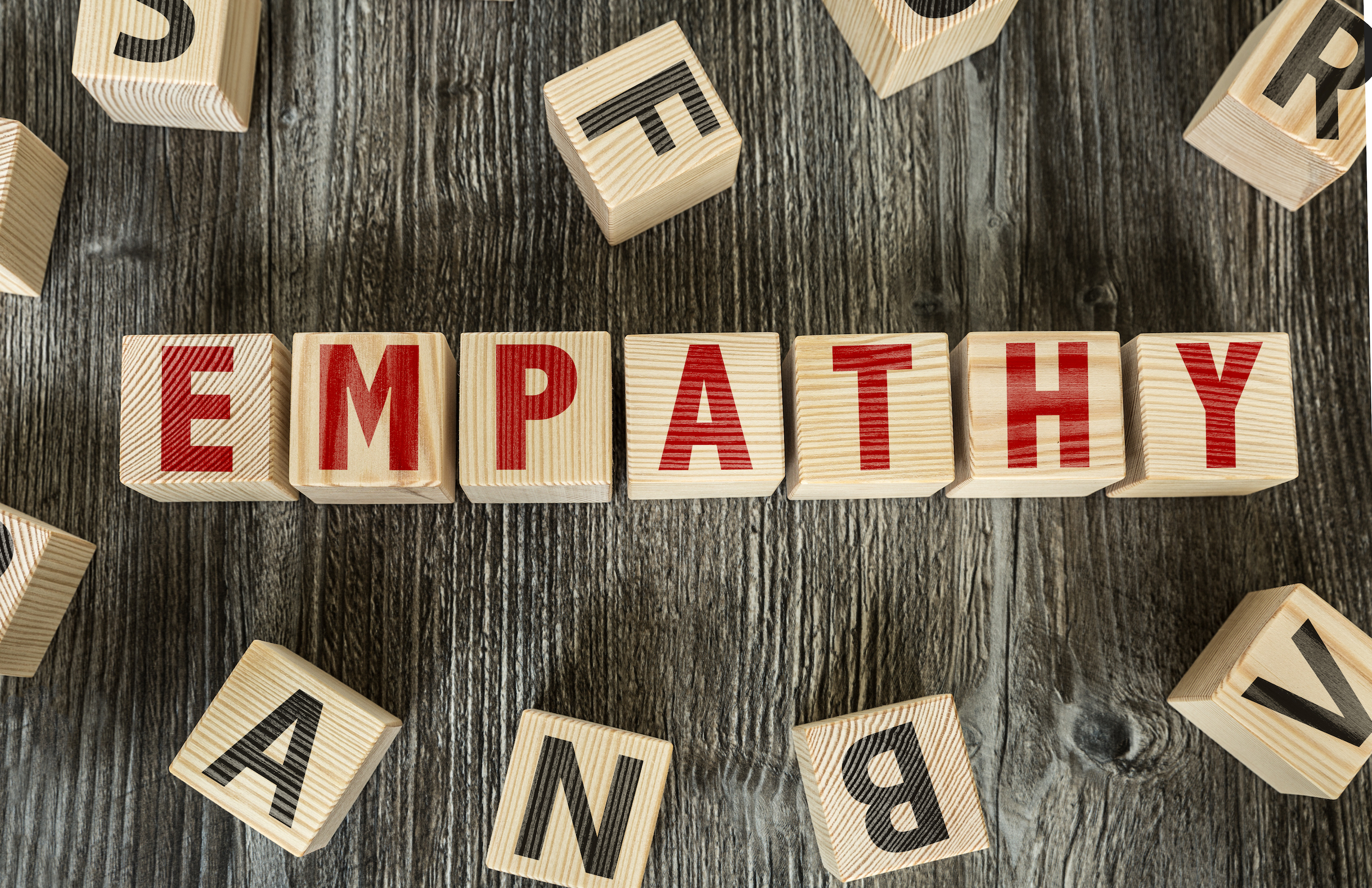Counseling & Therapy for Individuals, Couples, & Families in Little Rock, AR. Find out when therapy is indicated, Becky's … Learn More

Empathize today or lose your relationship tomorrow.
Just about every adult knows that the characteristic described as empathy is a desirable trait. Without it, interactions between two people become very problematic, as I see weekly in my marriage therapy practice, with at least 50 percent of the couples I work with, at some point, declaring, “(Insert partner’s name here) has NO empathy.”
I explain the concept of empathy so often that I have to believe a lot of people don’t know what it is. So today we’ll lay it all out, and as a result I imagine this will be one of the most shared articles I’ve ever written. Why? Because so many people want and need it, and don’t get it.
I think part of the confusion about what empathy is has to do with the fact that there are different types. To be able to communicate to your partner what it is you want, you need to identify the type it is that scratches your itch, and tell your partner, “See this? This type of empathy is exactly what I need.”
So here are the three types of empathy:
Cognitive empathy is when we can put ourselves in someone else’s shoes and attempt to see things from their perspective. This can be very helpful in processing situations that make no sense to you, or when people are apt to make surface conclusions or judgments about something someone has done. Example: Why did the wife hide the receipts from the dress shop? Is it because she is deceitful and spends money she doesn’t have?
Answer: When we learn the rest of the story, which is absolutely crucial before making conclusions about things we hear, we find that she hides the receipts because her husband’s reaction is intensely negative whenever he sees receipts for things he deems unnecessary. The wife works and makes plenty of money, and so does he, but he is extremely frugal and has values that include not spending money on things that are not absolutely needed. She hides receipts to avoid his negative reaction. The cognitive empathy perspective helps us understand the woman’s situation in total, and say, “You know, I’d probably do that, too, in those circumstances. She’s not deceitful at all, she just can’t be herself around him. That is really sad.”
Emotional empathy is the kind where someone actually tunes in to the same pain you are feeling, and feel it themselves. We cannot expect that anyone do this, as people feel what they feel, and feelings cannot be manufactured. When I feel emotional empathy toward something or someone it typically catches me by surprise, like watching a commercial ad that moves me, or seeing a story on the news, or hearing a story from a client that just cuts me to the quick in the cruelty that one human being heaped on another, and I literally tune into and feel their pain in that moment.
Compassionate empathy is simply caring a great deal about what is going on with someone who is going through a trial or tribulation of some sort. The issue they are experiencing can be anything from a hangnail to a major chronic illness or impending death, it really doesn’t matter what it is, what matters is they are feeling distress. This is the kind of empathy that I see men and women starving for in their relationships, the kind that that so many people don’t receive.
Here is a typical example: The wife comes home later than usual from work and says, “I am just frazzled! I have so many things going on I can’t think straight, then, I had to go to the grocery where the lines were long, and they were training someone new and he was so slow. I just am at the end of what I can handle today!”
Right here is where the listener can either make or break an opportunity to offer compassionate empathy. The only thing this woman really needs is for her listener to care that she is in such a tizzy, to care that she is overloaded, that her life is, at least for this moment, unmanageable, and to verbalize that in a kind and loving way. Something like, “Honey, I am so sorry that your life is so stressful right now. Can I help you in any way?”
My husband says men are not on the wavelength to empathize with a complaining partner, and this will be like learning a foreign language to them. “They need to be hit on the head,” he says. “We didn’t learn this growing up, so we need to be told that this is how we should behave. If we didn’t see it in our family growing up we don’t know it is a necessary and healthy response to a complaining wife.”
But where listener/responders go off the rails is in judging the situation the person in distress is in to see if it is worthy of such upset, how it could have been prevented, telling them how what they did was wrong, or how other people are suffering far worse somewhere in the world, or offering solutions on how to fix it All of these responses will fall flat and do damage to your relationship, so you should not do it. A word on unsolicited advice: It is always unwelcome, no one likes it, and it breaks the laws of appropriate boundaries. In appropriate boundaries, we do not offer other adults insight or advice without their invitation or permission. If you feel you have the perfect solution, then after the moment of stress, and after things have settled down, ask, “May I offer a suggestion?” If your love does not want to hear or consider your suggestion, then step back and do not offer it. This is called being respectful.
Think about it this way, we humans love to be around people who are kind, nurturing, non-judgmental, and who offer compassionate insight and grace. Our romantic partner should be the ultimate person who does this for us. I tell clients all the time, “If it is not medicinal and uplifting, and not designed to make your partner feel loved, honored and cherished, then don’t say it.”
Now, here is a word about validation. Compassionate empathy needs to include a validating statement from the partner of the person in distress. Validation is the medicine your upset partner needs from you at the moment they cry out, it is like an arm reached out that will lift your love out of the pit of their bad moment. It comes in the form of your soft tone and comforting words, to validate is to say in a loving way, “I hear you, and I care.”
Example:
Partner says, “I am in distress because of X,Y and Z!”
You: Stop what you are doing, come to them and say, “I see that. I hear that you’re having a hard time, I hate that for you, baby, is there anything I can do?”
In a nutshell, marital responses need to offer safe haven from life’s storms, not I told-you-so’s or comments meant to shame or scold. It’s “treat others as you would like to be treated” in similar circumstances. Be kind and tender, loving and caring, or keep your lips closed.
Goal: Because of you loving actions and words, your partner will feel better, not worse. It’s very simple. Shower your partner with loving action when they are in distress, even if you don’t agree with why they are distressed, and even if you think they brought it upon themselves, none of what you think about the situation matters. What matters is your response to the distress, and that must come from the best part of your personality.

Empathize today or lose your relationship tomorrow.

Empathize today or lose your relationship tomorrow.
Just about every adult knows that the characteristic described as empathy is a desirable trait. Without it, interactions between two people become very problematic, as I see weekly in my marriage therapy practice, with at least 50 percent of the couples I work with, at some point, declaring, “(Insert partner’s name here) has NO empathy.”
I explain the concept of empathy so often that I have to believe a lot of people don’t know what it is. So today we’ll lay it all out, and as a result I imagine this will be one of the most shared articles I’ve ever written. Why? Because so many people want and need it, and don’t get it.
I think part of the confusion about what empathy is has to do with the fact that there are different types. To be able to communicate to your partner what it is you want, you need to identify the type it is that scratches your itch, and tell your partner, “See this? This type of empathy is exactly what I need.”
So here are the three types of empathy:
Cognitive empathy is when we can put ourselves in someone else’s shoes and attempt to see things from their perspective. This can be very helpful in processing situations that make no sense to you, or when people are apt to make surface conclusions or judgments about something someone has done. Example: Why did the wife hide the receipts from the dress shop? Is it because she is deceitful and spends money she doesn’t have?
Answer: When we learn the rest of the story, which is absolutely crucial before making conclusions about things we hear, we find that she hides the receipts because her husband’s reaction is intensely negative whenever he sees receipts for things he deems unnecessary. The wife works and makes plenty of money, and so does he, but he is extremely frugal and has values that include not spending money on things that are not absolutely needed. She hides receipts to avoid his negative reaction. The cognitive empathy perspective helps us understand the woman’s situation in total, and say, “You know, I’d probably do that, too, in those circumstances. She’s not deceitful at all, she just can’t be herself around him. That is really sad.”
Emotional empathy is the kind where someone actually tunes in to the same pain you are feeling, and feel it themselves. We cannot expect that anyone do this, as people feel what they feel, and feelings cannot be manufactured. When I feel emotional empathy toward something or someone it typically catches me by surprise, like watching a commercial ad that moves me, or seeing a story on the news, or hearing a story from a client that just cuts me to the quick in the cruelty that one human being heaped on another, and I literally tune into and feel their pain in that moment.
Compassionate empathy is simply caring a great deal about what is going on with someone who is going through a trial or tribulation of some sort. The issue they are experiencing can be anything from a hangnail to a major chronic illness or impending death, it really doesn’t matter what it is, what matters is they are feeling distress. This is the kind of empathy that I see men and women starving for in their relationships, the kind that that so many people don’t receive.
Here is a typical example: The wife comes home later than usual from work and says, “I am just frazzled! I have so many things going on I can’t think straight, then, I had to go to the grocery where the lines were long, and they were training someone new and he was so slow. I just am at the end of what I can handle today!”
Right here is where the listener can either make or break an opportunity to offer compassionate empathy. The only thing this woman really needs is for her listener to care that she is in such a tizzy, to care that she is overloaded, that her life is, at least for this moment, unmanageable, and to verbalize that in a kind and loving way. Something like, “Honey, I am so sorry that your life is so stressful right now. Can I help you in any way?”
My husband says men are not on the wavelength to empathize with a complaining partner, and this will be like learning a foreign language to them. “They need to be hit on the head,” he says. “We didn’t learn this growing up, so we need to be told that this is how we should behave. If we didn’t see it in our family growing up we don’t know it is a necessary and healthy response to a complaining wife.”
But where listener/responders go off the rails is in judging the situation the person in distress is in to see if it is worthy of such upset, how it could have been prevented, telling them how what they did was wrong, or how other people are suffering far worse somewhere in the world, or offering solutions on how to fix it All of these responses will fall flat and do damage to your relationship, so you should not do it. A word on unsolicited advice: It is always unwelcome, no one likes it, and it breaks the laws of appropriate boundaries. In appropriate boundaries, we do not offer other adults insight or advice without their invitation or permission. If you feel you have the perfect solution, then after the moment of stress, and after things have settled down, ask, “May I offer a suggestion?” If your love does not want to hear or consider your suggestion, then step back and do not offer it. This is called being respectful.
Think about it this way, we humans love to be around people who are kind, nurturing, non-judgmental, and who offer compassionate insight and grace. Our romantic partner should be the ultimate person who does this for us. I tell clients all the time, “If it is not medicinal and uplifting, and not designed to make your partner feel loved, honored and cherished, then don’t say it.”
Now, here is a word about validation. Compassionate empathy needs to include a validating statement from the partner of the person in distress. Validation is the medicine your upset partner needs from you at the moment they cry out, it is like an arm reached out that will lift your love out of the pit of their bad moment. It comes in the form of your soft tone and comforting words, to validate is to say in a loving way, “I hear you, and I care.”
Example:
Partner says, “I am in distress because of X,Y and Z!”
You: Stop what you are doing, come to them and say, “I see that. I hear that you’re having a hard time, I hate that for you, baby, is there anything I can do?”
In a nutshell, marital responses need to offer safe haven from life’s storms, not I told-you-so’s or comments meant to shame or scold. It’s “treat others as you would like to be treated” in similar circumstances. Be kind and tender, loving and caring, or keep your lips closed.
Goal: Because of you loving actions and words, your partner will feel better, not worse. It’s very simple. Shower your partner with loving action when they are in distress, even if you don’t agree with why they are distressed, and even if you think they brought it upon themselves, none of what you think about the situation matters. What matters is your response to the distress, and that must come from the best part of your personality.
Copyright 2018 www.doctorbecky.com

Why getting dumped (when you’re single) is a good thing.
My office carpet has gotten wet many times with the tears of single men and women in the throes of intense pain felt from romantic rejection, usually asking, “What is wrong with me? Why didn’t they like me? What did I do wrong?”
It always pains me to see good people blaming a break up on themselves, and taking it so personally. My view is that getting released from a relationship that wasn’t meant to be is the same as being set free from a trap, so that one may live on and find someone who cherishes and adores them. In the end, it is wonderful news.
If a date you were interested in rejects you, it does not mean you are defective, and I find trying to figure out the puzzle of why a waste of time, but I know most people feel compelled to do it. Most rejecters will never reveal the real reason why you weren’t the one for them, either because the reason would cause you pain, or they themselves don’t know. What we can know is that for whatever reason, you two were not a match, and that’s OK, because for someone else, you will be.
Sometimes I tell my grieving singles that they might look at themselves as a type of animal, say, a dog, and the person who rejected them is a cat. Neither animal is defective, they are just not a match, and for all kinds of completely acceptable reasons. When you meet another dog who connects with you, who gets you, it’ll be a go. You’ll know it is a go because it will be easy, like a hand slipping effortlessly into a soft and luscious leather glove. A great love is never a difficult fit that needs to be squeezed or adjusted any which way, it just fits.
I have girlfriends who are with men I could never be with. They adore their man, and the men are very nice, and I like them and enjoy their company. They would not be for me. This is how it works. I’m OK with those men saying, “You know, I like Becky, but she would not be for me.” They are cats, I am a dog, it’s OK.
In graduate school I did a lot of research on what predicts a happy marriage, and what predicts divorce. Marriage and Family Therapists need to know these things as they advise individuals and couples constantly, and we obviously want to steer them toward the thinking and behaviors that predict happy relationships. One thing we know is that the more similar two people are along the major categories, like education, background, social status, age, attractiveness, power, interests, life stage, hopes and dreams, the more likely their relationship is to work over the long term. Some people may see this as shallow, but it is not an opinion, it is what the research has shown us time and again.
Think about it: Older wealthy Harvard graduate with very young high school grad with no income; wealthy trust fund woman with man from a middle-class background who works as a teacher; a young person longing for a family with an older person who has already done that; physician female with a stay-at-home male, A wealthy and established gay man with a young man who just wants to attach his trailer-car to that man’s engine.
No one in these groups is defective, but the circumstances are worth considering as potential obstacles in the relationship, as it takes two very special, well-adjusted people to be able to treat each other equally and respectfully when there are huge power differentials between the two, and not that many people have such solidness in how they see themselves.
Before I married again in 2013, I was single for about 11 years, and during that time I was rejected numerous times, and I also rejected numerous men. Never did I reject a gentleman because he was defective or not good enough. It was always because in some way, shape or form, we were not a match. Dog, cat, that’s it. Maybe I wasn’t feeling it, maybe his personality wasn’t right for me, maybe he traveled too much, but these were not defects. It was just that his traits were not a fit for me. These men were good people and would fit very well with someone else.
When I got rejected by men, I usually had a good laugh about it. The laughter was more about the ridiculous ways they would reject me rather than the dumping itself, but as I got healthier individually I always welcomed the news that a man didn’t see me as a fit for him, as it freed me to be available for someone who would.
In my head, I imagined that there was a finite number of men I was supposed to meet in the dating world, all standing in a line, and The One would be standing at the end – so in my mind, the sooner I made it through the line the sooner I’d find him. No need to waste any energy about why the guys in the line rejected me, or why I rejected them, it all boiled down to us not being a match. The day did come when I found the guy at the end of the line, and it was exactly like I thought it would be – non-anxiety-provoking, solid, easy, respectful, caring, mutual.
When you operate from the assumption that you are not defective, you won’t take rejection personally anymore, so to prepare yourself for healthy dating you might ought to be working on that, if you’re not already there. We are all unique and unlike anyone else, a little bit weird or quirky, definitely imperfect, but a perfect fit for the life we were meant to live. One day, you’ll look up and be face-to-face with the person at the end of line, so be ready.





 Becky Whetstone is an Arkansas native and has a Ph.D. in Marriage and Family Therapy from St. Mary’s University in San Antonio, Texas. She is a Licensed Marriage and Family Therapist (LMFT) in Texas and Arkansas.
Becky Whetstone is an Arkansas native and has a Ph.D. in Marriage and Family Therapy from St. Mary’s University in San Antonio, Texas. She is a Licensed Marriage and Family Therapist (LMFT) in Texas and Arkansas. 





















































































































